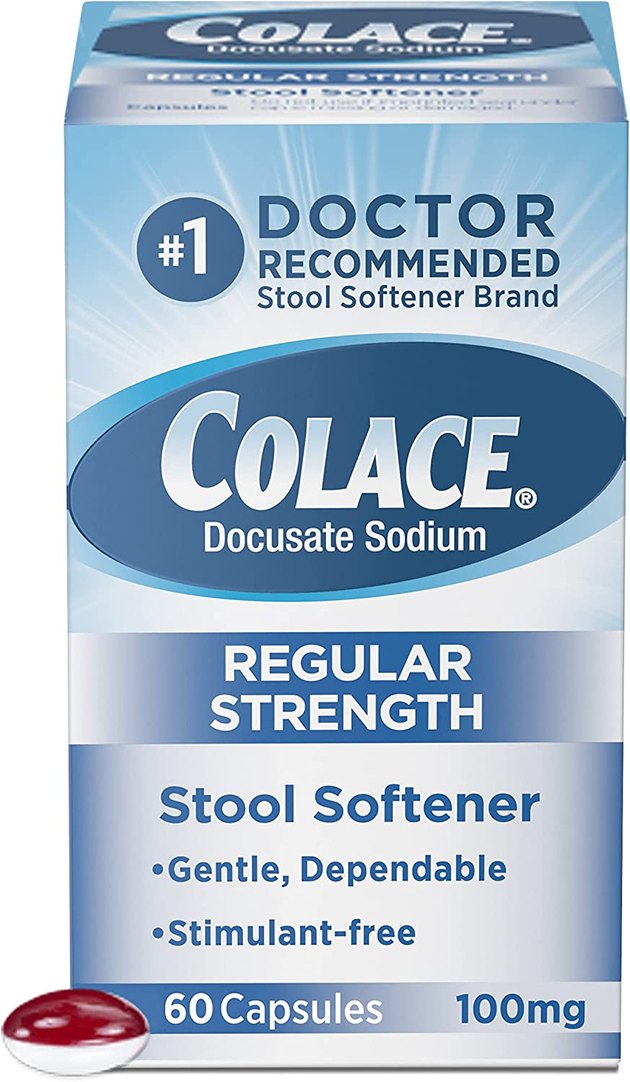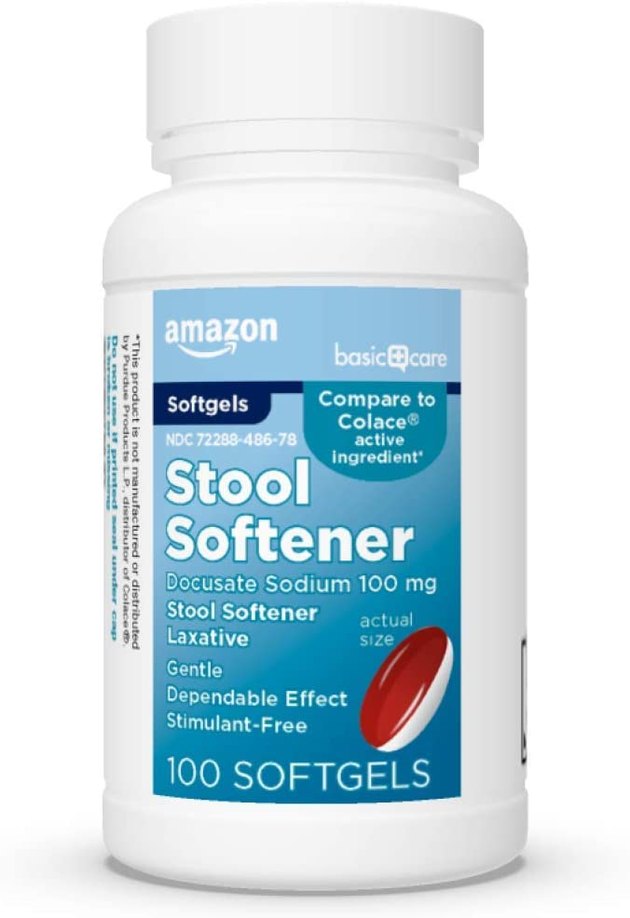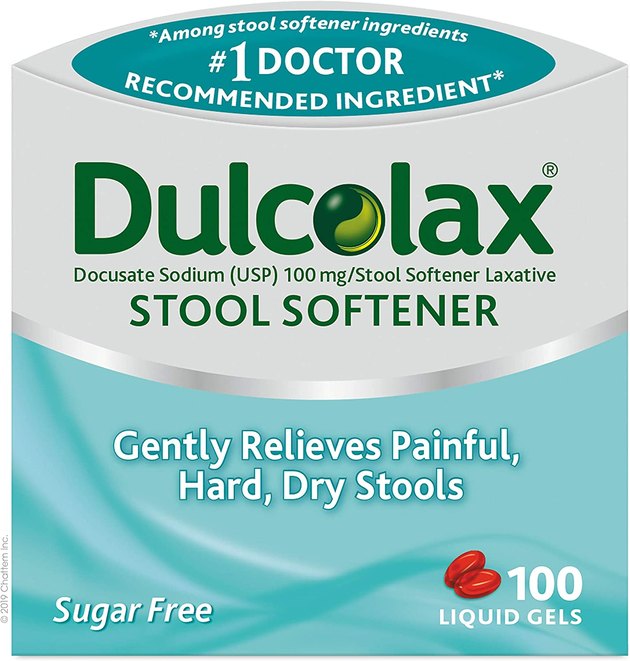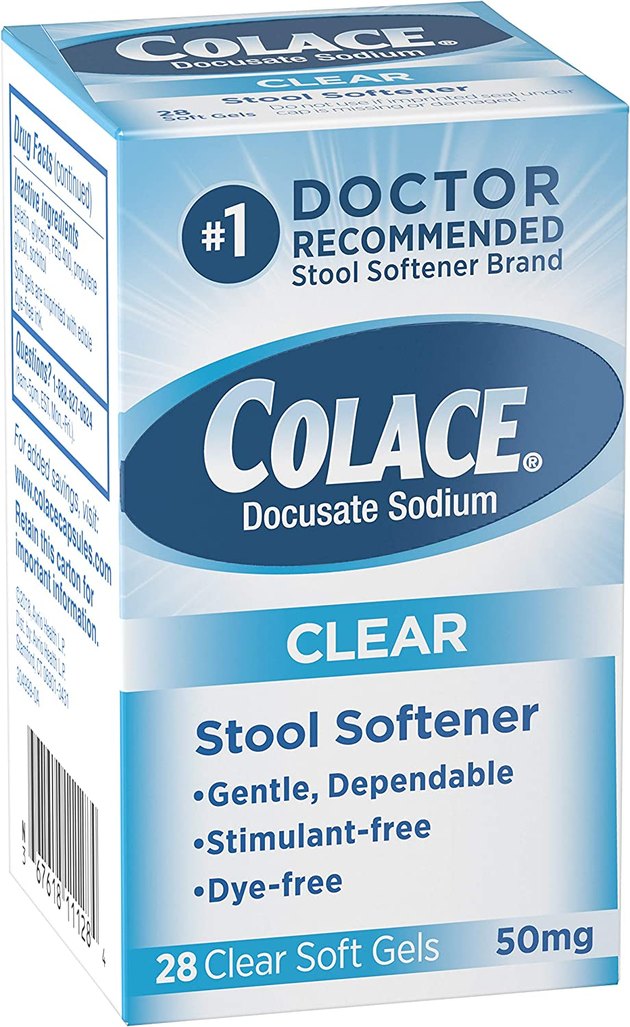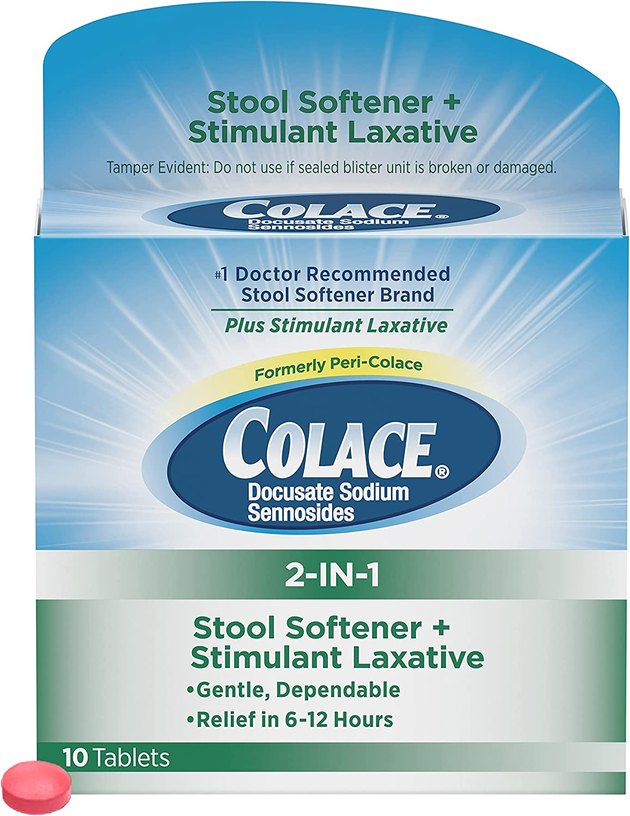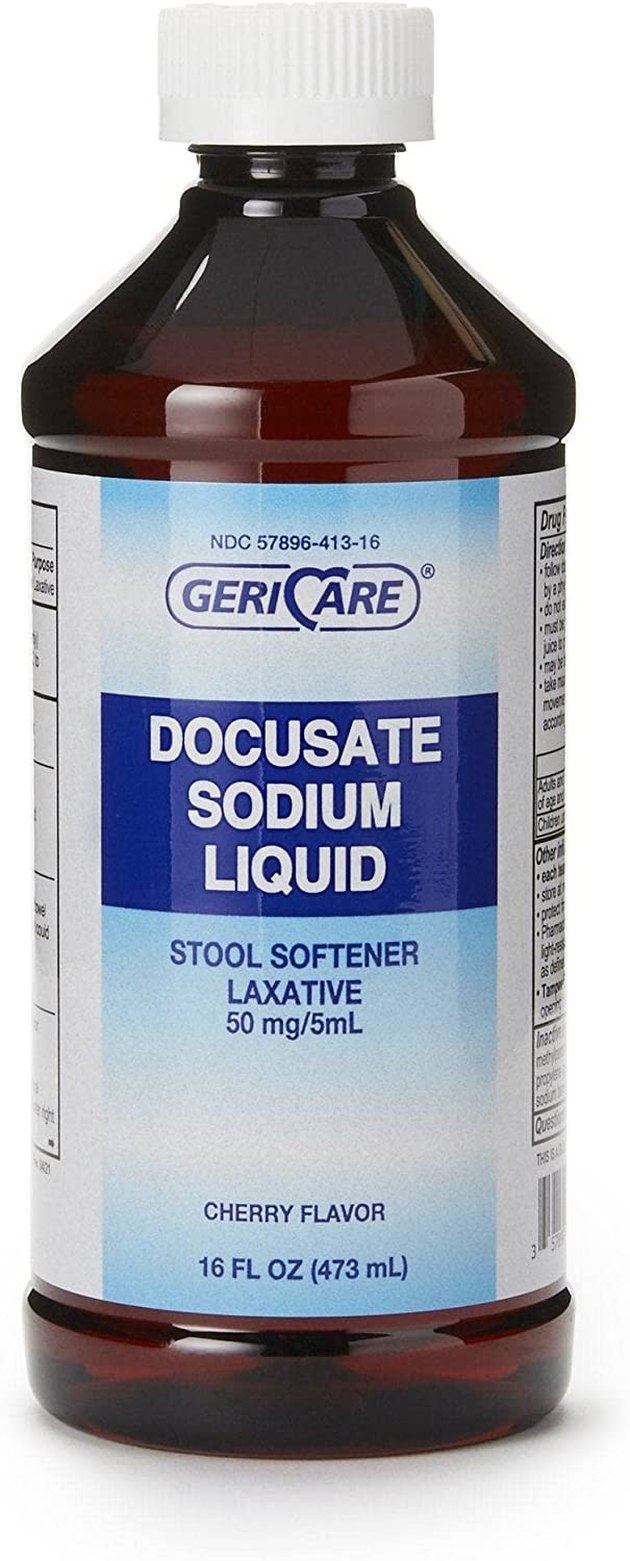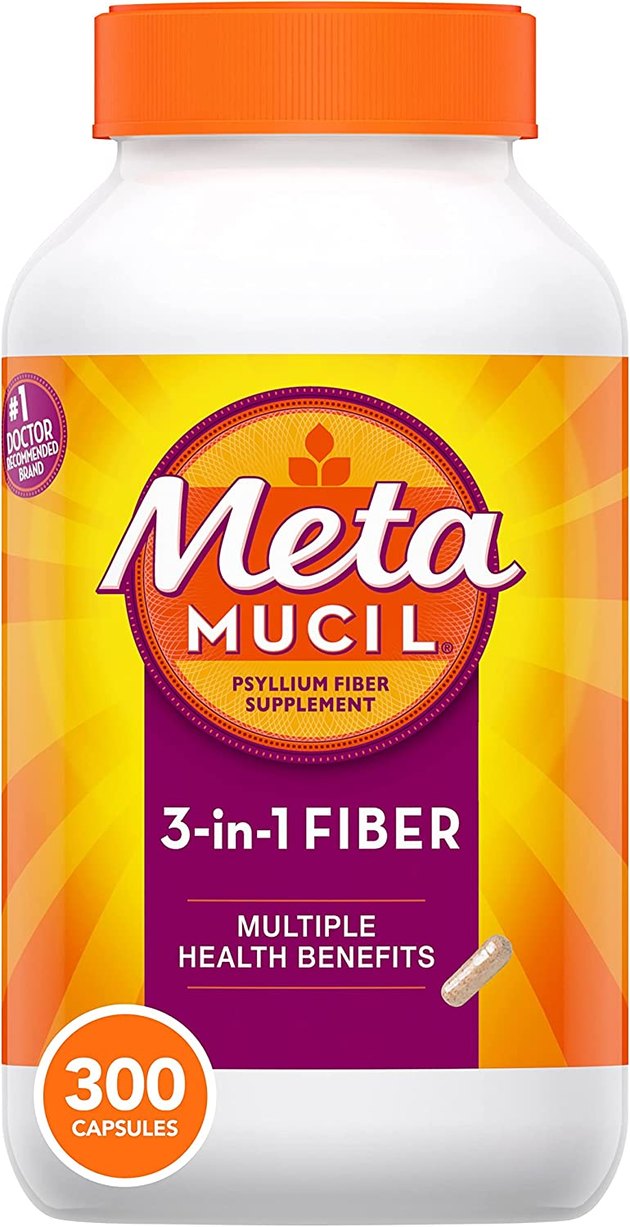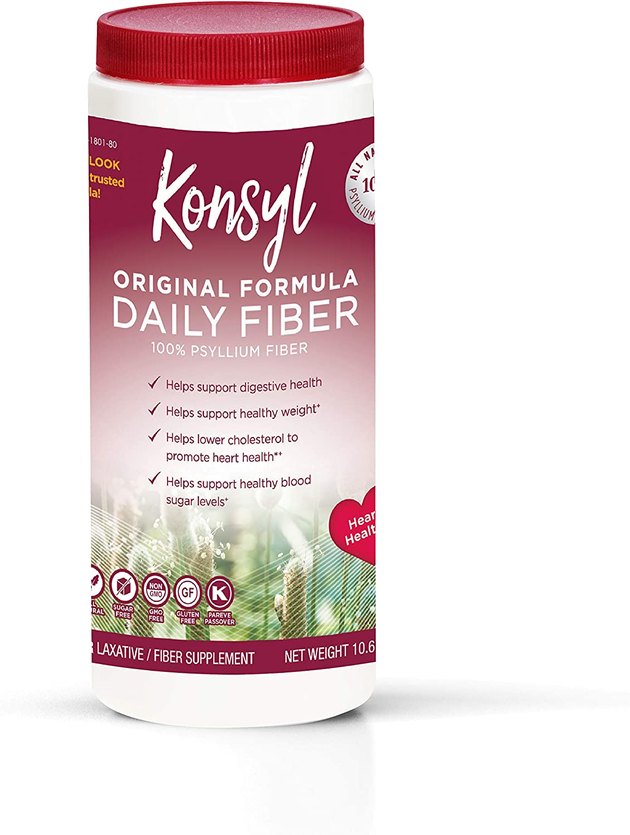
Constipation is uncomfortable and frustrating, so it's understandable if you're looking for a product to provide some relief. Stool softeners can often do the trick, but they shouldn't be your first line of defense.
Often, constipation is caused by not drinking enough fluids, not eating enough fiber or not moving enough (or a combination of these). Adding more fiber-rich foods to your diet, drinking plenty of water and exercising regularly should be the first strategies you try to move things along.
Video of the Day
Video of the Day
But if diet and lifestyle changes don't help, or you're dealing with other constipation culprits — such as pregnancy or certain medications — your doctor might suggest a stool softener.
Stool softeners are over-the-counter (OTC) medications that usually contain the active ingredients docusate sodium or docusate calcium. "Stool softeners increase the moisture of the poop so it's easier to pass," says Samantha Nazareth, MD, a board-certified gastroenterologist based in New York City.
Stool softeners are referred to as emollient laxatives because they draw moisture in to soften stool, according to StatPearls.
"They can help treat occasional constipation," says Priyanka Singh, MD, gastroenterologist and assistant professor at the Icahn School of Medicine at Mount Sinai. "They can soften otherwise hard stools that require you to push or strain excessively during a bowel movement."
"Other laxatives," such as stimulant laxatives like Dulcolax or Senokot, "directly affect the walls of the intestines, causing it to contract and move the poop along," says Dr. Nazareth.
There are also lubricant laxatives, which coat stools to make them more slippery, and osmotic laxatives (like Miralax and milk of magnesia), which help the intestines retain fluid, in turn softening stools.
Used correctly, stool softeners can be a helpful tool and a relatively gentle approach to combat constipation. Read on for everything you need to know about using these OTC meds safely and finding the right one for you.
Tip
It typically takes stool softeners about 12 to 72 hours to produce a bowel movement.
How We Chose
To create our list of the best stool softeners, we referenced information about managing constipation from leading expert groups, including the American College of Gastroenterology (ACG), the American Gastroenterological Association (AGA) and the American Academy of Family Physicians (AAFP), along with other credible sources such as the Mayo Clinic and Cleveland Clinic. We also spoke to Dr. Nazareth and Dr. Singh for additional context about using stool softeners.
To select our top picks, we looked for products that:
- Contain either docusate sodium or docusate calcium, two ingredients that are expert-recommended to help moisten stool and make it easier to pass
- Have a high percentage of positive online reviews for ease of use and efficacy
- Are available from trusted retailers
You can learn more about how we cover products here.
The Best Stool Softeners
- Best Overall: Colace Regular Strength Stool Softener (From $5.05, Amazon)
- Best on a Budget: Amazon Basic Care Stool Softener ($3.52, Amazon)
- Best Liquid Gels: Dulcolax Gentle Relief Stool Softener Laxative ($16.79, Amazon)
- Best During Pregnancy: Colace Clear ($8.69, Amazon)
- Best Fast-Acting: Colace 2-in-1 Stool Softener & Stimulant Laxative Tablets (From $8.03, Amazon)
- Best Liquid: Geri-Care Docusate Sodium Stool Softener Liquid ($19.95, Amazon)
1. Colace Regular Strength Stool Softener
Pros
- Trusted brand
- Effective
Cons
- Pricier than some options on our list
- Type: Capsules
- Main ingredient: Docusate sodium
When you think of stool softeners, the name Colace likely comes to mind; the brand has been trusted by patients and doctors for decades and is widely available.
Colace comes in a number of different OTC formulations, but the regular strength stool softener is a good first choice if you're struggling with constipation and diet changes haven't helped.
These stool softener capsules contain 100 milligrams of docusate sodium, and it's recommended that adults and children 12 years and older take one to three per day.
Reviewers say they're easy to swallow and don't leave behind any unpleasant taste.
2. Amazon Basic Care Stool Softener
Pros
- Excellent value
Cons
- Some reviewers say the softgels have a slight aftertaste
- Type: Softgels
- Main ingredient: Docusate sodium
Amazon Basic Care Stool Softeners are very similar to Colace Regular Strength, and both contain 100 milligram of docusate sodium.
But the generic Amazon brand is incredibly affordable: For a 100-count bottle, the price per pill is about $0.04, compared to $0.19 for the Colace option.
As with the Colace capsules, reviewers say the Amazon softgels aren't difficult to swallow, though some note that they leave behind a slight taste, so keep that in mind if that's something you're sensitive to.
3. Dulcolax Gentle Relief Stool Softener Laxative
Pros
- In liquid gel form for those who prefer it
Cons
- Not the most affordable stool softener option
Type: Liquid gels
Main ingredient: Docusate sodium
Another trusted stool softener brand is Dulcolax. As with Colace Regular Strength, Dulcolax contains 100 milligrams of docusate sodium.
This brand is a good choice for anyone who is partial to liquid gels, which tend to be a little easier to swallow and are taste-free.
Note: If you end up needing faster constipation relief, Dulcolax also offers a variety of other laxative types, including liquids and suppositories.
4. Colace Clear
Pros
- Gentle
- Dye-free
Cons
- May take longer to start working
Type: Softgels
Main ingredient: Docusate sodium
Constipation is common during pregnancy thanks to increased hormone levels that can result in a slower-than-usual digestive system.
As a first step to combat constipation, the American College of Obstetricians and Gynecologists (ACOG) recommends aiming for at least 25 grams of fiber per day from foods such as lentils and apples, as well as making sure you're drinking plenty of water.
But if diet changes don't help, ask your practitioner if they recommend you try a stool softener.
Stool softeners are generally considered safe during pregnancy, and Colace is often recommended to moms-to-be, per the Mayo Clinic. But you should still use them with caution, ACOG says, and check with your ob-gyn first.
"Ducosate sodium has not been shown to have adverse effects in pregnancy," notes Dr. Singh. Still, "increased intake of insoluble fiber, which is not absorbed by the intestinal tract, should be considered first if you are pregnant with constipation."
If you'd prefer to ease into using stool softeners, you might try Colace Clear, which has a lower concentration of docusate sodium (50 milligrams per capsule, compared to 100 milligrams in Colace Regular Strength). This variety also is free of dyes, which may be important to some.
Having a stool softener on hand can also be helpful in the postpartum period, because it may be stressful to go to the bathroom after giving birth if you have a perineal tear or painful hemorrhoids. ACOG says stool softeners can also be used during this time, but check in with your ob-gyn first.
5. Colace 2-in-1 Stool Softener & Stimulant Laxative Tablets
Pros
- Combines docusate sodium with senna for faster relief
Cons
- More expensive
Type: Tablets
Active ingredients: Docusate sodium and senna concentrate
Another form of Colace, the brand's 2-in-1 is both a stool softener and stimulant laxative: It contains 50 milligrams of docusate sodium along with 8.6 milligrams of senna concentrate.
The biggest benefit of a two-in-one treatment is you may notice faster results, because it softens stools while also stimulating the walls of the intestines to contract and move them along. Many reviewers note that this combination does seem to deliver faster relief than some other stool softeners they've tried.
Senna concentrate comes with its own risks and side effects to consider, though, so speak to your doctor before using it. Per the National Library of Medicine, you should look out for severe or long-lasting side effects like brown urine, faintness, stomach discomfort, cramps or nausea.
Warning
Consult your doctor before taking this product if you're pregnant or over the age of 65.
6. Geri-Care Docusate Sodium Stool Softener Liquid
Pros
- Available in liquid form
Cons
- Taste isn't very appealing
Type: Liquid
Active ingredient: Docusate sodium
Some people prefer or require a liquid stool softener instead of capsules, and Geri-Care's stool softener liquid is one of the best.
The downside is that, despite the cherry flavor, reviewers mostly agree that this liquid doesn't taste great.
Also note that the dose should be given in a 4- to 8-ounce glass of milk or fruit juice to prevent throat irritation, per the Cleveland Clinic.
Are There Natural Stool Softeners?
If you'd prefer to try a more natural approach before turning to OTC medications, your first strategy should be eating more fiber-rich foods, drinking plenty of water and getting regular exercise.
Natural stool-softening foods — which are high in fiber, sorbitol, sennoside A and other natural compounds that can help relieve constipation — include:
- Prunes
- Leafy greens like spinach and kale
- Rhubarb
- Chia seeds
- Flaxseed
These lifestyle changes may not work as quickly as an OTC stool softener, but they're healthy habits that can also help prevent constipation down the road.
If those changes don't help, you might also consider bulking agents. Also known as bulk-forming agents or fiber supplements, they add fiber to your stool and are usually considered the safest type of laxative, according to AAFP.
"They pull fluid into your intestines, which makes stool bigger or bulkier," says Dr. Nazareth. As a result, your colon is able to contract and push out stool more easily.
Dr. Nazareth warns that you should take bulking agents with plenty of water, because they could otherwise back up your bowel and make constipation worse. They can also cause side effects like bloating and belly pain.
Bulking Agents to Try:
What to Look for in a Stool Softener
Most over-the-counter stool softeners are functionally very similar, Dr. Nazareth says, which makes shopping for one a little easier. Still, keep the following features in mind when choosing a stool softener:
- Make sure the product you're considering is actually a stool softener. When shopping online, other constipation remedies such as stimulant laxatives, osmotic laxatives and bulking agents often appear in search results along with stool softeners. If you know you want an emollient laxative, check that the packaging says "stool softener" specifically and confirm it contains one of two active ingredients: docusate sodium or docusate calcium.
- Active ingredient: Again, stool softeners usually contain one of two active ingredients, docusate sodium or docusate calcium. ("Docusate sodium is more common, otherwise [there's] no difference," says Dr. Nazareth.) But check the packaging to make sure there aren't other active ingredients you should be aware of, such as in the Colace 2-in-1 product, which also contains a stimulant laxative.
- Type: There are a few different types of stool softeners available without a prescription. Oral tablets or capsules are the most common, and less often you'll find liquid or syrup stool softeners. You can also consider whether you have a preference as to pill type: some people prefer liquid gels, for example, because they tend to slide down the throat more easily and don't leave behind an aftertaste. But liquid gels may cost more than tablets or softgels.
When to Use Stool Softeners
Although doctors will sometimes recommend stool softeners or other kinds of laxatives for longer periods to address a specific concern, over-the-counter stool softeners should generally be used as a short-term treatment for constipation — no longer than one week, according to the AAFP.
Your best bet is to consult your practitioner for guidance, especially if you're taking any other medications that stool softeners could potentially interact with.
As with most OTC meds, stool softeners can come with some unpleasant side effects: nausea, stomach or intestinal cramps and even electrolyte imbalance can occur with prolonged use, per the Mayo Clinic and National Library of Medicine.
Most of the time, diet and lifestyle changes — eating more fiber-rich foods like prunes and whole-grain bread, staying well hydrated and getting enough exercise — can resolve constipation, the AAFP says. But if healthy-bowel habits don't seem to help, ask your doctor if a stool softener is right for you.
Tip
Unlike some other laxatives that should be taken either before or after eating, the best time to take a stool softener is at the end of the day, before bedtime.
How to Use Stool Softeners
Always follow the manufacturer's dosage instructions exactly as they appear on the packaging (including not taking the medication more than directed), and check with your doctor if you have any questions.
But in general, keep the following in mind when using stool softeners, per the Cleveland Clinic:
- Capsules or tablet stool softeners: Swallow them whole (don't chew or crush them) with an 8-ounce glass of water.
- Liquid stool softeners: Shake the bottle well and measure the exact dose using whichever measuring device came with the medication. To prevent throat irritation and help it taste better, mix the dose with 4 to 8 ounces of milk or fruit juice.
Whichever type you take, make sure to stay hydrated: "Adequate water intake makes stool softeners more effective, as they draw water into stool," Dr. Singh says.
It can take a day or two for a stool softener to work, so remember, too, that results likely won't be immediate (in other words, there are no stool softeners that work in 30 minutes). If you can't poop even after you've taken this kind of laxative, you may just need to give it more time to work with your body.
Warning
Stop taking any stool softener immediately if you experience bleeding from your rectum or develop diarrhea that doesn’t resolve. Call your doctor if these symptoms persist.
When to See a Doctor for Constipation
Hopefully lifestyle changes and short-term stool softener use improve your constipation so you can use the bathroom comfortably. But reach out to your practitioner if you notice any of the following, per the AGA:
- Your constipation lasts longer than three weeks, or your symptoms are generally very disabling.
- You have stomach pain when going to the bathroom.
- There are changes in your stool, such as poop that's consistently thinner, black or has blood in it, or you notice blood when you wipe after using the bathroom.
- You've started to lose weight in addition to experiencing any of the symptoms above.
- Your doctor tells you you're anemic.
- American Academy of Family Physicians: “Laxatives: OTC Products for Constipation”
- American College of Gastroenterology: “Constipation and Defecation Problems”
- American Gastroenterological Association: “Constipation”
- American College of Obstetricians and Gynecologists (ACOG): “Problems of the Digestive System”
- American College of Obstetricians and Gynecologists (ACOG): “What can help with constipation during pregnancy?”
- Cedars-Sinai: “How to Relieve and Avoid Constipation Naturally”
- Cleveland Clinic: “Constipation”
- John Hopkins Medicine: “Constipation”
- Mayo Clinic: “Constipation”
- Mayo Clinic: “Is it safe to take stool softeners to treat pregnancy constipation?”
- Mayo Clinic: “Over-the-counter laxatives for constipation: Use with caution”
- National Institutes of Health, National Library of Medicine, MedLinePlus: “Stool Softeners”
- National Institutes of Health, National Library of Medicine, MedLinePlus: “Senna”
- National Institutes of Health, National Institute of Aging: “Concerned About Constipation?”
- National Institutes of Health, National Institute of Diabetes and Digestive and Kidney Diseases: “Constipation”
- StatPearls: “Docusate”
- StatPearls: “Laxatives”
Is this an emergency? If you are experiencing serious medical symptoms, please see the National Library of Medicine’s list of signs you need emergency medical attention or call 911.
